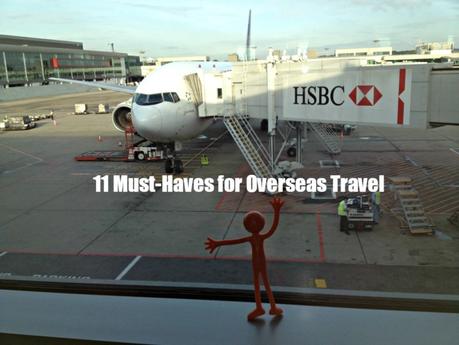As you prepare to travel abroad, you may begin to feel overwhelmed by all the things to remember. Worry not, we’re here to help. Here is a list of the essential things you’ll need to do before heading to the airport.

Documents
1. Get a passport. If you already have one, check its expiration date. Most countries won’t let you in if the expiration date is less than 6 months away. If you need a new passport, apply right away, don’t wait. Although we got ours in less than a month it has sometimes been known to take as long as 3 months to arrive.
2. Get your visas. Not all countries offer visas on arrival. Depending on your nationality each country has different arrangements, and requirements can change. Waiting for a visa can take a month or more, so submit your visa application early and ensure it will be valid for your entire stay.
Tip: Click here to check the visa requirements for your destination.Medical preparations for traveling
3. Medications. If you use medication, ensure you have enough to last throughout the duration of your trip. Carry a copy of your prescription for added security. Also, if you are undergoing any special treatment, consider carrying a scanned copy of your records or a letter from your doctor detailing your treatment.
4. Check with your insurance carrier. Ask your medical insurance provider if your policy applies overseas for emergencies. If it doesn’t or if you want to add extra coverage, ask about supplemental insurance.
5. Verify country-specific vaccinations. Some countries won’t let you enter without proof you’ve been immunized against certain diseases, such as yellow fever or malaria. All immunizations must be recorded and presented on an official International Certificate of Vaccination, also known as the “yellow health card.”
Tip: Click here to check vaccination requirements for your destination.Financial preparations for traveling
6. Make sure your credit card will work in the country you’re visiting. Does your card have a chip? European banks have switched to chip-and-PIN technology, and fewer businesses abroad accept the outdated magnetic-strip cards.
7. Let your credit card know your plans. Few things are worse than not being able to access funds while overseas. Tell your bank when you’ll traveling and where you will be, and ask them to add the information to your file.This way, your bank’s fraud department may freeze your account, assuming someone’s stolen your number. Also, if you are renting a car overseas, find out if your credit card offers any coverage for damages to a rental car.
Tip: Add the card’s phone number to your contacts to ensure you can quickly call the bank in an emergency.8. Pay your upcoming bills. Sign up for your bank’s Bill Pay feature and online access so you can transfer money and/or pay bills while you’re overseas. Alternatively, you may want to pay any bills in advance or leave signed checks with a trusted friend.
9. Check entrance/exit fees. Some countries require travelers to pay an entrance or departure fee, which can cost as much as $200. These fees are not included in the price of your airline ticket, so budget accordingly.
Destination research
10. Buy tickets before you arrive. Tourists can often get special discounts that locals cannot access. Many cities offer a pass that offers free or discounted admission to major attractions and transportation. By buying in advance you’ll be able to skip the ticket lines and better plan your itinerary.
11. Search and download apps and maps beforehand. There are many apps to help you plan your trip and navigate while there. To avoid data charges from your wireless carrier, download all your travel apps before you leave and ensure that any apps you choose can be accessed offline.
Staying in touch while you travel
12. Register with your embassy. If there’s an unforeseen problem in the country, this will alert your government where you are and get you to safety. It’s also smart to print out the address and contact information of the local embassy.
13. Activate your phone’s global capabilities. There’s usually a charge for doing this, but it is much less than the roaming charges you’ll get if you don’t.
14. Share your travel plans. Let loved ones know your travel plans so they can contact you. In the unlikely event there’s a news event or catastrophe in one of your destinations, knowing where you actually are may put their minds at ease. When a volcano spewed ash into the air over western Indonesia our friends were relieved to know that we were far from the action, enjoying Bali’s sunny weather.
Tip: If your family is concerned about your destination (Mexico and Israel for instance), use the State Department’s travel warnings and alerts to set their minds at ease.Security while traveling
15. Prepare for backup. Set up an account with a service like DropBox or an internet photo gallery before you leave so you can back up your photos and computer files on the road. It’s peace of mind in case you lose your electronics.
16. Home security. Ask a friendly neighbor to keep an eye out for deliveries, and have your local post office hold your mail while you’re gone. Have someone check on your place once a week and, if you rent, let your landlord know you’ll be away.
17. Keep copies of documents on hand. If something happens to your passport or wallet, you’ll need all of your identifying information. Use your phone’s camera to take a photo of the important passport pages (personal information and visa) and photo ID so you will have it on hand in an emergency. For extra reassurance, pack color copies of all your important documents in your suitcase.
(Visited 2,779 times, 1 visits today)
